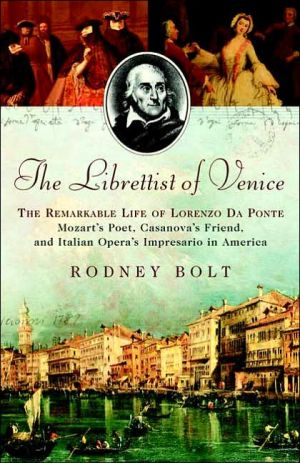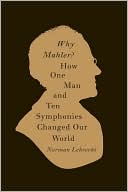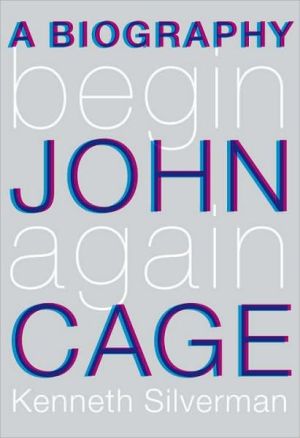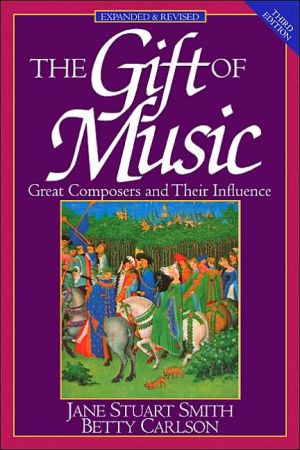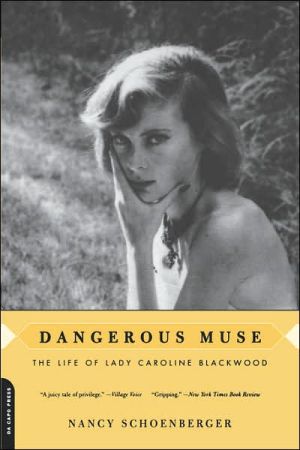Librettist of Venice: The Remarkable Life of Lorenzo da Ponte: Mozart's Poet, Casanova's Friend, and Italian Opera's Impresario in America
The operatic life of the librettist for Don Giovanni and The Marriage of Figaro.\ In 1805, Lorenzo Da Ponte was the proprietor of a small grocery store in New York. But since his birth into an Italian Jewish family in 1749, he had already been a priest, a poet, the lover of many women, a scandalous Enlightenment thinker banned from teaching in Venice, the librettist for three of Mozart's most sublime operas, a collaborator with Salieri, a friend of Casanova, and a favorite of Emperor Joseph...
Search in google:
The operatic life of the librettist for Don Giovanni and The Marriage of Figaro.In 1805, Lorenzo Da Ponte was the proprietor of a small grocery store in New York. But since his birth into an Italian Jewish family in 1749, he had already been a priest, a poet, the lover of many women, a scandalous Enlightenment thinker banned from teaching in Venice, the librettist for three of Mozart's most sublime operas, a collaborator with Salieri, a friend of Casanova, and a favorite of Emperor Joseph II. He would go on to establish New York City's first opera house and be the first professor of Italian at Columbia University. An inspired innovator but a hopeless businessman, who loved with wholehearted loyalty and recklessness, Da Ponte was one of the early immigrants to live out the American dream.In Rodney Bolt's rollicking and extensively researched biography, Da Ponte's picaresque life takes readers from Old World courts and the back streets of Venice, Vienna, and London to the New World promise of New York City. Two hundred and fifty years after Mozart's birth, the life and legacy of his librettist Da Ponte are as astonishing as ever. The Washington Post - Jonathon Keats Da Ponte died in New York in 1838. His life may have been as melodramatic as a grand opera, but it has taken Bolt's masterful biography to transform him, 168 years later, from stage character to historical figure.
\ From the Publisher"A vivid book…As picaresque as Da Ponte's…Readable and fun." - Joan Acocella, The New Yorker\ \ \ \ \ Charles McGrath… [Bolt] is judicious and well informed, ably sorting out fact from apocrypha (much of it stemming from Da Ponte’s highly unreliable memoirs), and smart enough not to burden the story with a lot of interpretation. It’s a remarkable yarn on its own, and a reminder that the 18th century was in many ways the great age of self-invention, when people were able to refashion themselves, like quicksilver, over and over again.\ — The New York Times\ \ \ Jonathon KeatsDa Ponte died in New York in 1838. His life may have been as melodramatic as a grand opera, but it has taken Bolt's masterful biography to transform him, 168 years later, from stage character to historical figure. \ — The Washington Post\ \ \ \ \ Publishers WeeklyEnglishman Bolt, who has written on Christopher Marlowe (History Play), relishes the telling of the poor motherless Jewish boy from Venice's ghetto, born Emanuele Conegliano, whose father converted the family to Christianity in 1763 in an attempt to improve his fortunes. Renamed Lorenzo Da Ponte (1749-1838), after the bishop who converted him, the boy was schooled at a seminary and became a scholarly poet whose amatory entanglements in Venice eventually got him deported. Using his legendary wit and charm, Da Ponte insinuated himself into the graces of Hapsburg Emperor Joseph II, who established an Italian opera company in Vienna, attracting such young composers as Salieri and Mozart. Although he had never written a libretto, Da Ponte was appointed theater poet, which sparked a genius collaboration with Mozart on operas such as Le Nozze di Figaro, Don Giovanni and Cosi Fan Tutte. With the emperor's death in 1790, Da Ponte again fled town with his young English bride, Nancy Grahl; he eventually sailed to America, to become a New York grocer, businessman and professor of Italian at Columbia College. Reading Bolt's lively narrative of Da Ponte's life from the ghetto of Venice to the sparkling opera houses of Europe is pure pleasure. (July) Copyright 2006 Reed Business Information.\ \ \ \ \ Library JournalTravel writer Bolt (History Play: The Lives and Afterlife of Christopher Marlowe) here turns his attention to Lorenzo Da Ponte (1749-1838), best known as the librettist for Mozart's three most familiar Italian-text operas (The Marriage of Figaro, Don Giovanni, and Cos fan Tutte). He chronicles Da Ponte's fascinating life, from his early years as a priest in Italy, to his womanizing and playing confidante to nobility in the capitals of Europe, to his experiences as a grocer, Italian professor, and opera promoter in America. Throughout, vivid descriptions of locales and breathless tales of intrigues hold the reader's attention. Bolt's scholarship is well documented but appears at odds with his highly charged style, so the author's intended audience is unclear. Furthermore, the organization of endnotes requires scanning a page for a specific word or phrase rather than for a corresponding number. Despite these cautions, Bolt's title is recommended for all libraries as a more detailed complement to Sheila Hodges's Lorenzo Da Ponte: The Life and Times of Mozart's Librettist, which it parallels extensively. (Sixteen-page color insert not seen.)-Barry Zaslow, Miami Univ. Libs., Oxford, OH Copyright 2006 Reed Business Information.\ \ \ \ \ Kirkus ReviewsLively biography of the Italian librettist of Mozart's three most famous operas emphasizes his restless desire for distinction. Lorenzo Da Ponte (1749-1838) insinuated himself into the elite cultural life of Venice, Vienna, London and New York through the sheer force of his energy, talent and boldness, avers Bolt (History Play, 2005). Born to Jewish parents in the State of Venice, Da Ponte converted to Christianity and seized the new opportunity for education and patronage by becoming a priest, a gifted teacher of seminarians and a poet capable of remarkable improvisations to the accompaniment of a violin or harpsichord. An affair with a married woman forced him into exile in music-mad Vienna; there, under the protection of Emperor Joseph II, he became poet to the court theatre and the newly established Italian opera company. He collaborated with Salieri, Mart'n y Soler and most memorably with Mozart; Don Giovanni, The Marriage of Figaro and Cosi fan tutte are still staples of today's repertory. Bolt is at his best examining this high point of Da Ponte's life, taking us behind the scenes to dissect not only the composition of the operas but also the politicking, backbiting and pettiness of all those involved in this collaborative art. The withdrawal of royal patronage, a new emperor and some political intrigue led to his departure for London, where the vogue for all things Italian meant money to support his new wife and his many siblings still in Venice. As the impresario of the King's Theatre, he rewrote operas to suit the unsophisticated English audience's taste. Bad business deals reduced him to bookselling and finally to fleeing for New York to escape his debts. In the New World forhis last 32 years, Da Ponte pieced together a life as a grocer, bookseller and teacher (Columbia's first professor of Italian), serving as Italy's informal cultural ambassador. A thorough, well-rendered account of Da Ponte's unique talents.\ \
